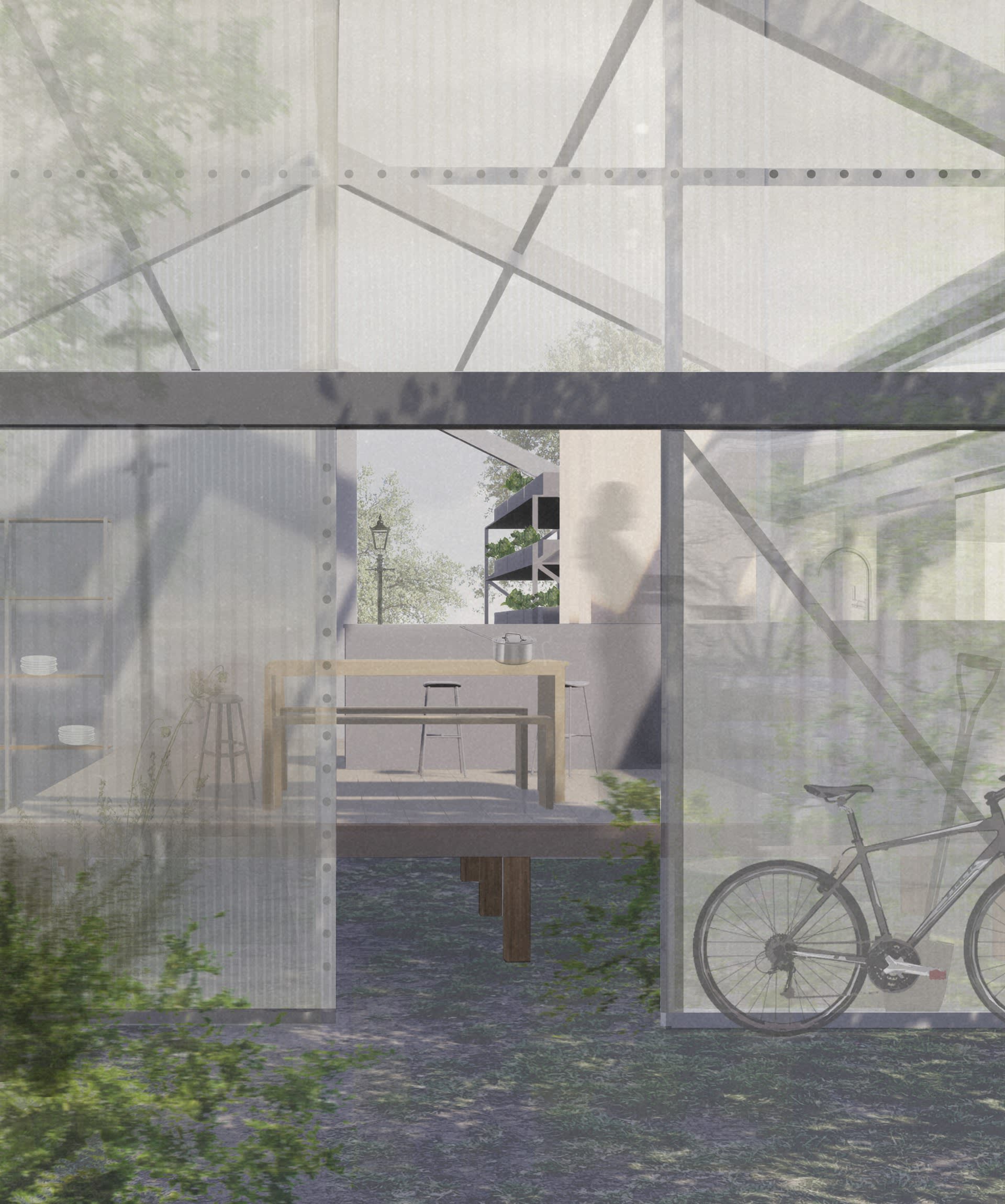I believe that architecture can be used as an analytical device, through a range of methods and mediums to investigate social change, human rights violations and that cuts through architectural, journalistic and legal fields, shifting between critical reflections and tactical interventions.
The project understands catastrophe as the commodification of food production and consumption and looks at the current food delivery systems that dominate our urban spaces. By investigating current exploitation and working conditions that have arisen due to platform capitalism the project then focusses on an alternative food system that is designed for human need rather than profit.
The project challenges the wage and class struggle by turning Clapham Common back into common ground, a site for growing. The current allotment site is greatly increased to cover half of the common, reverting the use of the park back to the days of the 1940’s Dig for Victory Campaign. Structures are positioned across the site with a range of programs, from cooking and dining facilities to educational and day care cabins. These pavilions also act as a social welfare space, catering for nutrition, mental health and early detection, providing an alternative socio-cultural function in sharp contrast to our current food system.
The aim of the strategy is to foster greater food citizenship, increase community cohesion, engage individuals with agriculture and nature to enhance the consumers sense of place. By bringing the production of food back to our daily lives it will not only democratise the food system, but also allow our cities to achieve food security, a topic which has been highlighted due to the pandemic.
The project builds on existing cooperative food networks in South London for the residents of Lambeth and Wandsworth. Members who grow on the site will have access to freshly cooked meals, food boxes, learning facilities and dining cabins. Free meals are given each week to those who work on the plots, hold cooking classes, construction and cultivation classes or provide day care for children.
This new system will not only be beneficial to our diets and the climate, but it also allows for a transparency to know where our food is coming from and support local economies, by undoing the commodification of food, where we all become growers and producers, the class struggle can be rewritten and chefs and food workers will not be exploited.


![[untitled]](https://res.cloudinary.com/rca2020/image/upload/f_auto,h_1075,w_1920,c_fill,g_auto,q_auto/v1/rca2021/60c70f35101fec8c9f5f545b-576713?_a=AXAH4S10)
![[untitled]](https://res.cloudinary.com/rca2020/image/upload/f_auto,h_1084,w_1920,c_fill,g_auto,q_auto/v1/rca2021/60c70f35101fec8c9f5f545b-618512?_a=AXAH4S10)
![[untitled]](https://res.cloudinary.com/rca2020/image/upload/f_auto,h_1068,w_1920,c_fill,g_auto,q_auto/v1/rca2021/60c70f35101fec8c9f5f545b-635946?_a=AXAH4S10)
![[untitled]](https://res.cloudinary.com/rca2020/image/upload/f_auto,h_871,w_1488,c_fill,g_auto,q_auto/v1/rca2021/60c70f35101fec8c9f5f545b-19756?_a=AXAH4S10)
![[untitled]](https://res.cloudinary.com/rca2020/image/upload/f_auto,h_1078,w_1920,c_fill,g_auto,q_auto/v1/rca2021/60c70f35101fec8c9f5f545b-673370?_a=AXAH4S10)
![[untitled]](https://res.cloudinary.com/rca2020/image/upload/f_auto,h_1077,w_1920,c_fill,g_auto,q_auto/v1/rca2021/60c70f35101fec8c9f5f545b-90228?_a=AXAH4S10)
![[untitled]](https://res.cloudinary.com/rca2020/image/upload/f_auto,h_1337,w_1920,c_fill,g_auto,q_auto/v1/rca2021/60ccbdd898de755bbfd28db4-691744?_a=AXAH4S10)




![[untitled]](https://res.cloudinary.com/rca2020/image/upload/f_auto,h_634,w_1920,c_fill,g_auto,q_auto/v1/rca2021/60c72898101fec8c9fa43bb6-135203?_a=AXAH4S10)
![[untitled]](https://res.cloudinary.com/rca2020/image/upload/f_auto,h_607,w_1920,c_fill,g_auto,q_auto/v1/rca2021/60c72898101fec8c9fa43bb6-804521?_a=AXAH4S10)
![[untitled]](https://res.cloudinary.com/rca2020/image/upload/f_auto,h_1311,w_1920,c_fill,g_auto,q_auto/v1/rca2021/60c72646101fec8c9f9bdeac-155925?_a=AXAH4S10)